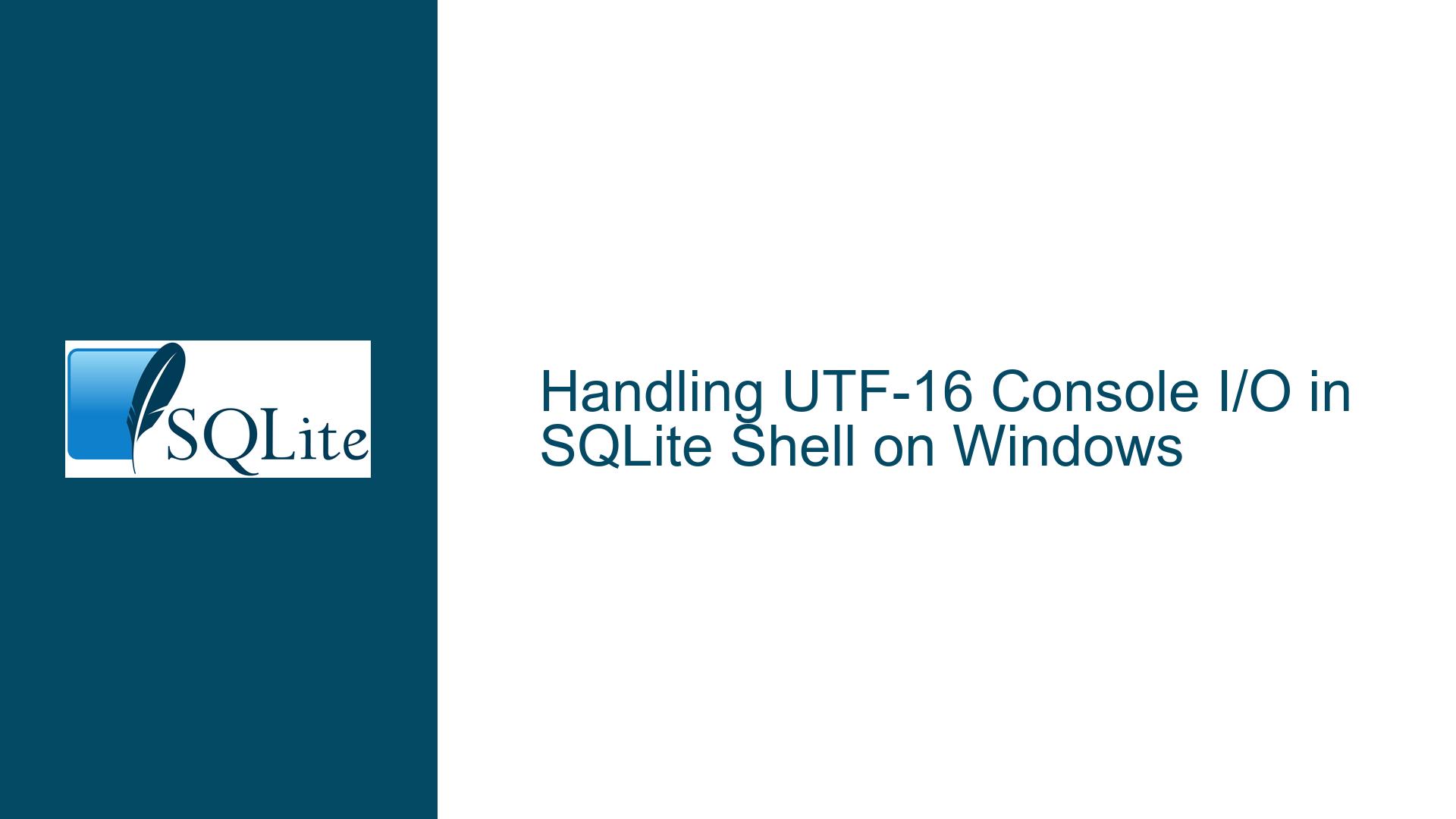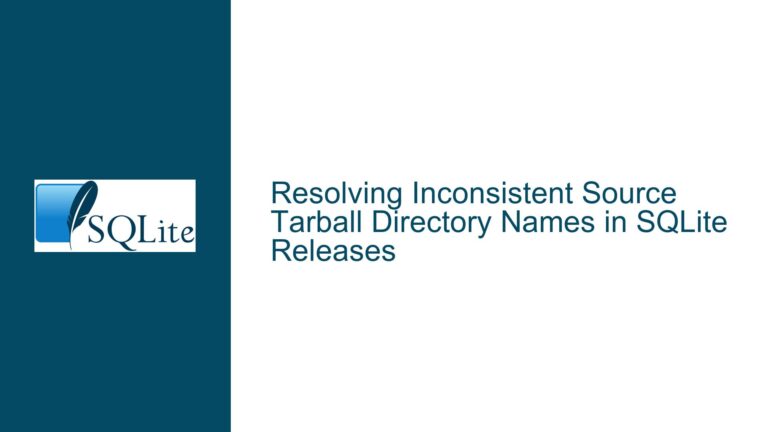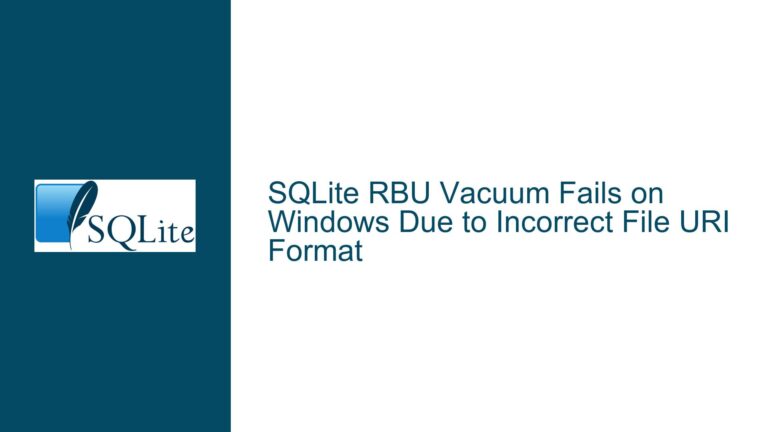Handling UTF-16 Console I/O in SQLite Shell on Windows
UTF-16 Console Output and Input Issues in SQLite Shell
The core issue revolves around the SQLite shell’s handling of console input and output on Windows systems, specifically when dealing with UTF-16 encoded text. The current implementation attempts to translate UTF-8 encoded output to Multi-Byte Character Set (MBCS) for console display, which can lead to inefficiencies and potential data corruption. The proposed patch suggests replacing the MBCS translation with direct UTF-16 handling using ReadConsoleW and WriteConsoleW functions. This approach aims to improve performance and ensure accurate rendering of Unicode characters in the Windows console.
The primary challenge lies in the transition from UTF-8 to UTF-16 encoding, which requires careful handling of memory allocation, buffer management, and console mode settings. The patch introduces new functions win32_console_getline and modifies utf8_printf to handle UTF-16 directly. However, this transition introduces several potential pitfalls, including improper handling of console modes, buffer overflows, and incomplete writes due to system limitations.
Improper Console Mode Settings and Buffer Management
One of the critical issues identified is the lack of proper console mode configuration before using ReadConsoleW and WriteConsoleW. The Windows console has several modes that control how input and output are processed, such as ENABLE_LINE_INPUT and ENABLE_ECHO_INPUT. Failing to set these modes correctly can lead to unexpected behavior, such as incomplete line reads or missing echo of input characters.
Additionally, the patch introduces dynamic buffer management for reading input lines, which can lead to memory allocation issues if not handled correctly. The win32_console_getline function uses realloc to resize the buffer as needed, but it lacks robust error handling for cases where memory allocation fails. This can result in memory leaks or crashes if the system runs out of memory.
Another concern is the handling of "short writes" in WriteConsoleW. While the function is designed to write a specified number of characters to the console, there are cases where it may not write the entire buffer in one go. This can happen due to system limitations or interruptions, leading to incomplete output. The current implementation does not account for this possibility, which could result in truncated or corrupted output.
Implementing Robust UTF-16 Console I/O with Proper Error Handling
To address these issues, the following steps should be taken to ensure robust UTF-16 console I/O in the SQLite shell:
- Configure Console Modes Properly: Before using
ReadConsoleWandWriteConsoleW, the console modes should be set to ensure proper handling of input and output. This includes enablingENABLE_LINE_INPUTandENABLE_ECHO_INPUTfor interactive input, and restoring the previous modes after the operation is complete. This can be achieved using theSetConsoleModefunction.
DWORD dwMode = 0;
HANDLE hConsole = GetStdHandle(STD_INPUT_HANDLE);
GetConsoleMode(hConsole, &dwMode);
SetConsoleMode(hConsole, dwMode | ENABLE_LINE_INPUT | ENABLE_ECHO_INPUT);
- Handle Buffer Allocation and Reallocation Safely: The
win32_console_getlinefunction should include robust error handling for memory allocation and reallocation. This includes checking the return value ofreallocand handling cases where memory allocation fails. Additionally, the buffer size should be managed carefully to avoid unnecessary reallocations and potential buffer overflows.
if (n + 50 > nLine) {
nLine = nLine * 2 + 50;
wchar_t* newBuffer = realloc(zLine, nLine * sizeof(wchar_t));
if (newBuffer == NULL) {
free(zLine);
shell_out_of_memory();
}
zLine = newBuffer;
zWLine = (wchar_t*)zLine;
}
- Handle Short Writes in
WriteConsoleW: TheWriteConsoleWfunction should be used in a loop to ensure that the entire buffer is written to the console, even in cases of short writes. This involves checking thelpNumberOfCharsWrittenparameter and repeating the write operation until the entire buffer is processed.
DWORD nWritten = 0;
DWORD nToWrite = (DWORD)wcslen(z2);
while (nToWrite > 0) {
if (!WriteConsoleW(outHandle, z2 + nWritten, nToWrite, &nWritten, NULL)) {
// Handle error
break;
}
nToWrite -= nWritten;
nWritten += nWritten;
}
- Ensure Proper Cleanup and Resource Management: The
utf8_printfandwin32_console_getlinefunctions should ensure that all allocated resources are properly freed, even in error conditions. This includes freeing any temporary buffers and restoring the console modes to their original state.
va_start(ap, zFormat);
if (stdout_is_console && (out == stdout || out == stderr)) {
char* z1 = sqlite3_vmprintf(zFormat, ap);
wchar_t* z2 = sqlite3_win32_utf8_to_unicode(z1);
int outfd = _fileno(out);
HANDLE outHandle = (HANDLE)_get_osfhandle(outfd);
sqlite3_free(z1);
fflush(out);
WriteConsoleW(outHandle, z2, (DWORD)wcslen(z2), 0, 0);
sqlite3_free(z2);
} else {
vfprintf(out, zFormat, ap);
}
va_end(ap);
By following these steps, the SQLite shell can achieve robust and efficient handling of UTF-16 console I/O on Windows systems. This will ensure accurate rendering of Unicode characters, proper handling of interactive input, and reliable output even in cases of system limitations or interruptions.





